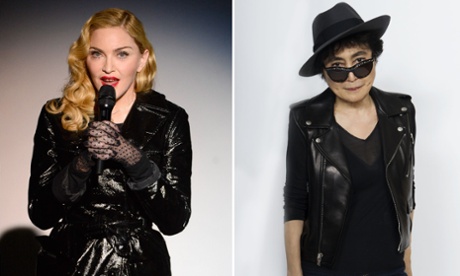
Yoko Ono turned 82 on 18 February, and noted the occasion with an open letter titled Don’t Stop Me!, addressed to critics who think it unseemly that she’s still making music at her age. Ono doesn’t often respond to criticism, but whatever has been flung at her lately has evidently flustered her. “I don’t want to be old and sick like many others of my age. Please don’t create another old person,” she begins, going on to defend her singing and the right to wear hot pants in the video for her 2013 track Bad Dancer. “I am afraid of just one thing,” she concludes. “That those ageism criticism [sic] will finally influence me … Because dancing in the middle of an ageism society is a lonely trip.”
Lonely indeed. Ono is one of the oldest artists to have an active multidisciplinary career, and her age has given detractors another weapon to batter her with. Yet a musician needn’t be 82 to feel the sharp end of the ageism stick. Madonna woke the morning after her Brit awards tumble to hundreds of tweets that referenced her age as reason to sympathise with her fall.
Youth is ageist. Madonna was probably just as condescending when she was 23 – I know I was. Nobody can blame young people for seeing age as something to be feared and patronised, when Ono herself depicts it as a landscape of infirmity and decline.
It’s only when one passes 40 and realises that the unthinkable is happening – one day you look in the mirror and realise the bloom of youth has been replaced with a quality called maturity – that ageism begins to feel personal. It affects men and women, but in the music business, it affects female artists disproportionately. Dozens of examples bear this out: Iggy Pop is 67, and frequently shirtless, but gets more stick for his insurance ads than for showing us what a topless man in his late 60s looks like. Tony Bennett is applauded for still touring at 88, and his musical partnership with Lady Gaga has raised her stock among those who were previously disdainful about her abilities.
Ono and Madonna are tackling ageism in their own ways, one publicly decrying it, the other ignoring it. Each to her own. Madonna’s refusal to be affected by age is inspiring. She looks, dresses and sounds exactly as she pleases,. Five seconds after her fall, she was back on her feet, singing from where she left off, chipper as a teenager. She must have been in considerable pain – and has since revealed that she suffered whiplash – but to give in to it would have involved losing face, and given the trolls even more ammunition.
I get the impression that she sees ageing as a mere barrier in a career that’s consisted of steaming through barriers – from the early assumption that she needed men to write and produce her records, to her recent contretemps with Radio 1, which refused to A-list her current single. (The station denied accusations that this was based on her age, and has since claimed its only consideration is “musical merit”.) Somehow, you feel, she’ll plough through society’s distaste for older women and create her own version of midlife, where she continues to be a successful artist and dates people she finds attractive, whatever their age.
Ono says: “I am covering my ears not to listen to you guys! Don’t stone me! Let me be! Love me plenty for what I am!”
Is it too much to hope that Ono, Madonna and every other female (and male) musician who’s navigating midlife and beyond will be loved plenty for who they are?

